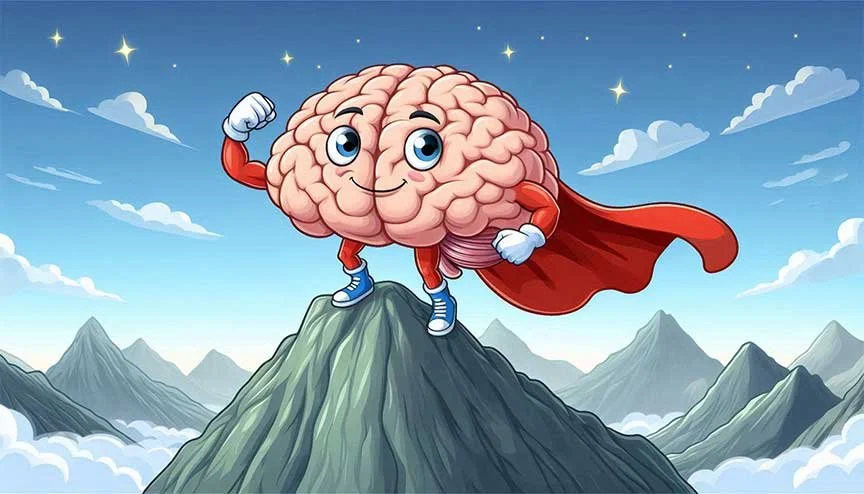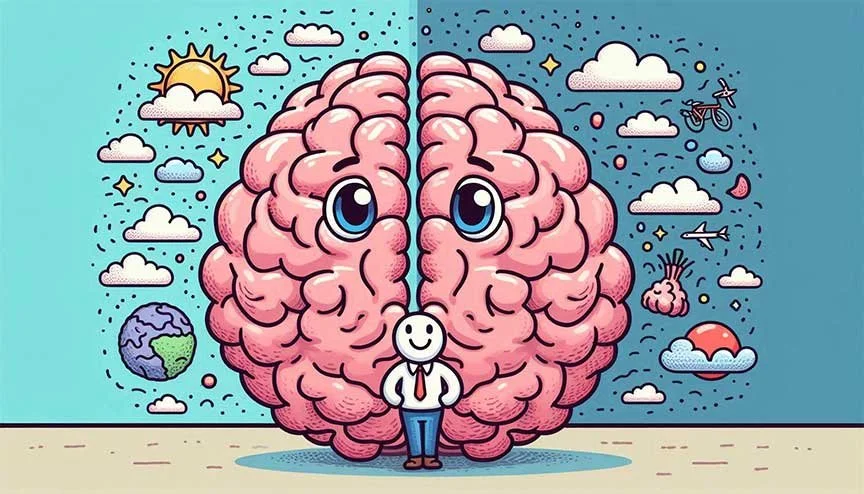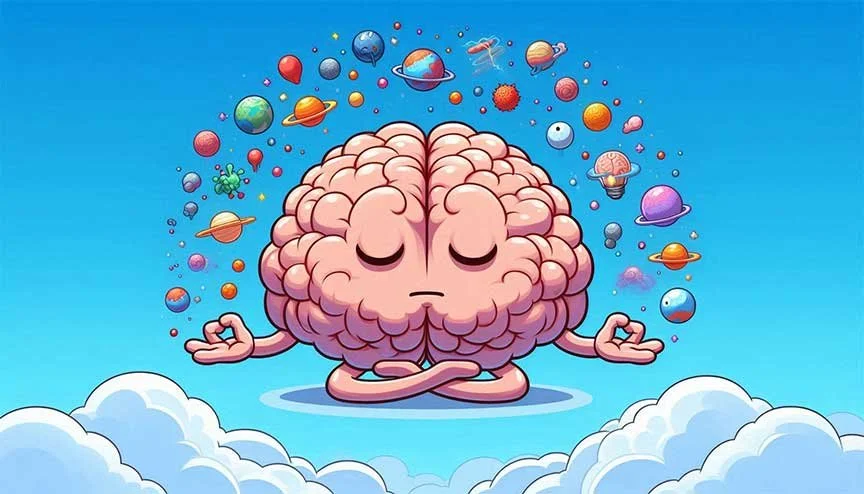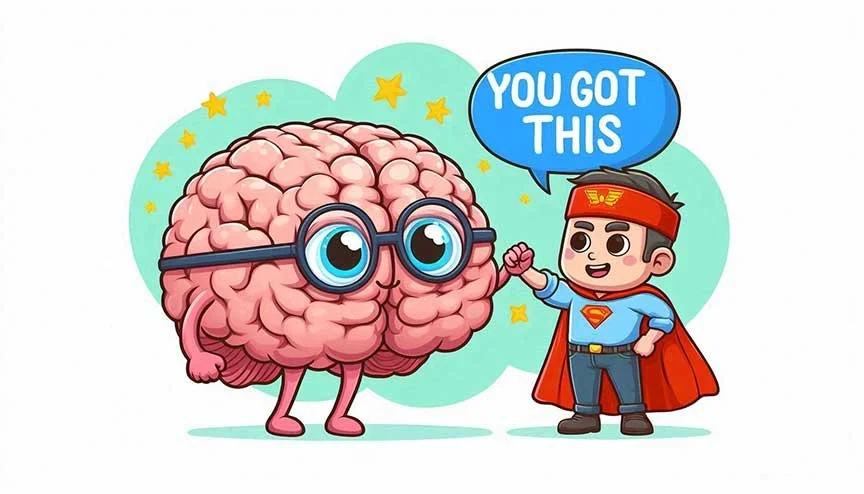Believe in Yourself: Cultivating Confidence and Self-Esteem with ADHD - Part 1
Struggling with low self-esteem as an adult with ADHD? You’re not alone. Many adults with ADHD face unique challenges that can erode their confidence and self-worth. The good news is that you can take concrete, small, daily steps to build self-esteem and literally change your reality! In this three-part post an ADHD Coach will explain in how our self-image erodes over time and then explore simple confidence and self-esteem boosting strategies with real world examples and insights garnered from the successes of ADHDers just like you!
Just like this quickly made AI generated brain, you too can build up that confidence!! (And yes, I’ve totally fallen down the rabbit hole of image generation prompt writing!)
Knowing my audience, I decided to break this post up into smaller chunks. I realized I had a lot of practical information and insights on this topic because I touch on it with every single one of my clients. Confidence and self-esteem are foundational needs of successful people. People with ADHD especially thrive on even the smallest amounts energy that comes when they feel good about ourselves! So let’s figure out how to get more of that yes please!
Part 1: We’ll create a foundation of understanding by looking at the most common ways people with ADHD, especially adults, suffer from low confidence and self worth. We’ll also look at how “reality” relates to your self-perception so we can understand a bit of the mechanics beneath the techniques to build confidence and self-esteem - AKA AWESOMENESS!
Part 2: We’re going to cover several techniques for improving your confidence and self-esteem with specific insights tailored to adults with ADHD. You’ll also get to see me in the hospital because I wasn’t practicing these techniques!
Part 3: Even more simple and effective techniques for improving that confidence and self-worth for adults with ADHD!
What Causes Low Self-Esteem in Adults with ADHD?
Understanding the root causes of low self-esteem for people with ADHD is the first step in addressing it. If you don’t know where these causes are coming from then it’s hard to identify and deal with it. Adults with ADHD often face persistent challenges that can slowly chip away at their self-confidence over years. The most common contributors to this slow decline are shared amongst all us people but more specifically us ADHDers because we are more prone to mistakes than others without ADHD. Long term, this can lead to depression which we are also prone to experience. (Wonderful!) It’s hard being a people, especially a people with ADHD when the expectations of success are measured by the majority. Let’s take a look at three common issues that us ADHDers experience regularly, or have in the past, so we know what to look for.
Negative Feedback: Years of hearing criticism or being labeled as "lazy" or "inattentive" can deeply affect your self-perception. While these two words are the ones you may most commonly associate with ADHD there’s piles of more subtle comments us ADHDers are exposed to that are often thrown out in jest even by our friends! We can slowly associate these comments with ourselves. Here’s some smaller comments that add up over time:
“Dude, you’re too talkative!”
“You’re too fast! If you would just slow down this wouldn’t be so hard.” (Ah, childhood.)
“You’re a bit much to be around.”
“Are you even paying attention?”
“It’s like you just don’t care.” - This one always hurts. We have big feelings. We care A LOT.
Comparisons to Others: Watching peers succeed where you struggle can lead to feelings of inadequacy. All us humans are wired to focus on the negative aspects of our own behaviors. From an evolutionary perspective this is actually great as it tells us, fairly directly, what we may be lacking or need to work on in order to survive or find a mate. However, when the majority of the people around us all act the same way and don’t struggle as much as we do with the same tasks, it’s very easy to fall into the trap of “less than.” On top of this, we may try to emulate what others are doing and still fail! When this happens we tend to look inward for the reasons of failure.
ADHD Coach Insight: Let’s flip this around shall we? Remember that your interest is a super power. (I know you hear this a lot and if that sounds corny or pandering then this little insight is for you!) When your enthusiasm is targeted upon something you want to do you will find you are suddenly determined, motivated, and very, very capable. Suddenly we are struggling less and probably no longer feeling inadequate, at least in this situation. Often times we aren’t even aware of this. When this happens we often feel the task is “easy” or we get lost in it. Now imagine what it’s like for someone without ADHD trying to do or learn the same thing. What might they feel watching you put so much time and effort into the same thing so effortlessly and enthusiastically? Do you think they might compare themselves to you and feel the same as you when the circumstances are reversed? Our problem is we tend to overfocus on what we can’t do vs what we can do. Food for thought.
Unrealistic Expectations: Holding yourself to standards that don’t align with your unique brain wiring can create a sense of failure when you fail at your lofty goals. On top of this we struggle to even set realistic goals because they aren’t as interesting or challenging as the vision of success we have in our heads. Why go for average when we can shoot for “AMAZING?!” We also forget that most tasks for us take us longer, we may need more breaks, or we could struggle in ways we aren’t even aware of yet. This can leave us feeling deflated or incapable when the desired outcome doesn’t materialize fast enough, or at all, which blows! Years of unfinished projects or dreams unrealized slowly erodes the belief in ourselves.
How People with ADHD Create Unrealistic Expectations
I’m going to throw some experience as a Coach at ya here to drill down on this one. People with ADHD are often unaware of their levels of enthusiasm. This lack of awareness means we can get caught up in the big delicious outcomes we’re after and completely miss all the steps, the work, required to achieve our goals. Instead we tend to overfocus on the outcome in these very attractive imaginations that slowly grow to expand beyond our near term capabilities. This is where our time blindness affects both our awareness of how long this may take and the expectations that the rewards, or completion, are just around the corner. When the reward of achievement doesn’t happen soon enough we can become deflated and distracted and even abandon our goals all together. This can lead to a lack of confidence in oneself.
What Can You Learn From Unrealistic Expectations with ADHD?
One thing I’ve noticed with most of my clients, which I now warn of, is the perception that your initial foray into a new activity that sparks your interest is going to be your default capability moving forward. Typically this is far from the truth.
Part of my job as an ADHD Coach is to get my clients moving into action. To do this I often try to cultivate tailor made challenge, novelty, and interest in my clients to get them going. This is like rocket fuel for the ADHD brain!
What can happen, despite my cautioning, is that ADHD enthusiasm takes hold and my clients get really motivated and actually over-do their goals. This isn’t necessarily a bad thing depending on how it’s perceived. For example, we may set a realistic goal of getting to the gym one time this week because you have a busy work schedule. Next week, however, you come and tell me you went to the gym four times, kept a work out journal, and joined a yoga class! Come three weeks later and your interest and enthusiasm has waned, understandably. All you see now is, “I only went twice this week and skipped the yoga class.” (We’re now focusing on what you didn’t do, vs what you did do, all based off that first bit of enthusiasm and not the actual goal you set your yourself.)
Out of breath me at the gym! When any of my clients are working on getting to the gym I send selfies of myself there to encourage them. “You got this!”
How “over doing it” is a good thing: Now we’ve learned how powerful your ADHD can be when properly aligned and utilized. We broke through those initial barriers and did more than we thought we could! We’ve also learned where and how you tend to overdo things. We’ve learned about ADHD enthusiasm and unrealistic expectations AND how to get it pointed in the right direction! Now we just need to work on the awareness of overdoing it.
For those ADHDers out there who don’t know how their ADHD works this behavior and lack of awareness can lead to momentary highs and bursts of self-esteem that later fall apart when enthusiasm and capability wane. The point that is often missed, as in this example, is the goal was to start going to the gym as part of a fuller life you are building, not to become the next body building great. Remembering you weren’t going to the gym previously and now you are is acceptance and fulfillment from a realistic expectation!
To Consider: What interest did you have in the past that you may have given up on because you couldn’t maintain that initial “rocket fuel level interest?” Would you enjoy going back to it?
YOUR ADHD ENTHUSIASM IS A POWERFUL TOOL THAT CAN BE HONED AND ALIGNED TO YOUR GOALS AND PURPOSE.
Build Self-Esteem and Confidence with ADHD by Changing Your Reality!
Before we jump into the “how to” part of building ourselves up, I think it’s important to understand why and how some of the techniques to build yourself up work. Building self-esteem involves changing how you view yourself and your capabilities starting from the inside. The view you have of yourself is highly influenced by both your internal monologue and the external world, or reality, around you. This is the spot in this post I explain the statement in the introduction, “and literally change your reality!!”
What is Reality and How Does it Relate to Self-Perception?
The way “changing reality” works is fairly complex scientifically, psychologically, and philosophically, but also quite simple. When we narrow this down to the acceptance that our perceptions of ourselves and the world around us is defined by our thoughts, feelings, body sensations, values, morals, and past experiences, we find reality is what we make of it. Thus we hit the fun question, “What is reality? Is it what I make it out to be or something that exists outside myself? Or both? While I’m not going into those questions, my point is that reality is the summation of all you experience now and in the past both internally and externally. This includes the thoughts and feelings inside of you, like the time your mom said you were lazy when you were twelve, and the fact that the sweater you’re wearing is itchy and causing frustration right now! All of this creates a state of being, awareness, and belief that you can become the victim of if you don’t pay attention to it.
You can try this nonsense I’m espousing on (very real nonsense) yourself right now. Think about something in the future that you’re looking forward to or dreading. Close your, eyes, breath, and think on it until you start to feel an emotional and ideally physical response in your body. There you go. You’ve literally changed the reality of how you’re feeling as well as your perception of what the future may hold. Before you did this the future could have been anything. and your state was not how it is now. And to push this further, that thought about the future may influence how you respond to other inputs right now. If you felt dread and anxiety you may be more likely to ‘snap’ at someone asking how you’re doing. If you chose to think of something in the future you’re looking forward to you might reply to the same person with a big smile! Which future did you choose to focus on? Something you were looking forward to or dreading? If you chose dread, take a few breaths and relax your shoulders. Moving on….
For us ADHDers we can get caught up in reality bending overthinking, or perseveration, when our internal monologue is very loud (you pay attention to it) We tend to spend a lot of time in our heads, which when left to wander, can over focus on the mistakes, missed appointments, and relationship troubles we may experience. That internal world and it’s monologue of ADHD chatter can slowly cause you to perceive yourself as lazy, incapable, or even just bad and perceive the future as miserable. Substitute the word “believe” for “perceive” in the previous sentence and it becomes evident how important our internal monologue is to our self-esteem.
However, there is hope! In the same way you may have changed that reality by focusing on all the bad stuff, you can actually do it in reverse!
Case in point: I used to suffer from a serious lack of self worth and confidence for the majority of my life despite being fairly accomplished. I now feel I’m pretty AWESOME! My ADHD didn’t go away so how did I do it? By understanding the concepts in this post and practicing the techniques in part 2 and part 3!
How to change and support your inner beliefs by acting on the external world:
Reality changes when we choose to change it internally or externally. Previously, I asked you to imagine something you were looking forward to or dreading in the future. This shifted your internal state (hopefully so you got the idea) and your perceptions of your future. We can do the same thing externally by beginning with the internal….
If, for example, you endeavor to be a kinder person you would first start with the idea, “I want to be a kind person.” Or, even “I am a kind person!” Right now you have no proof you are a kind person, only an internal belief and understanding of the concept of kindness and how one acts if kind. However, once you act upon the external world in ways you believe are kind you are both testing out your new belief and acting upon your desire to make it reality.
The external world may now reciprocate this belief back at you when those you are kind to express thanks or simply state, “Wow you’re so kind!” You have now affected the external reality of your world to affirm your initially tenuous belief that you are a kind person. Reality has shifted to align with your efforts and so too has your internal perception of yourself!
This reciprocal nature of our internal and external realities informing each other shows us the mechanisms at play when we want to change our self-perception to build some confidence and self-esteem.
That sad truth is, as I’ve explained, this works in negative ways adversely against us affecting our ability to succeed at this whole ‘life thing!’ When we make mistakes often or fail at things that other don’t then we are left believe we are a person who makes mistakes. Add the struggle that what works for people without ADHD often doesn’t for people with ADHD, and we can eventually lose hope. We ADHDers often set out to succeed in a world that was defined by the majority, not the minority. When all our little mistakes or failures go from the external world and become the focus of our over-active internal world, our monologue, then it’s not long before our actions follow suit! One thing I never enjoy hearing from prospective new clients is, “I’ll never be able to do it, so why bother trying.” Breaks my heart every time. So let’s look at changing your reality a bit!
To Consider: Raise your hand if you struggle to accept compliments like I used to for 40+ years? The external world is trying to tell you something. Why are you resisting reality? What perception of yourself are you holding on to and why?
WHAT WE FOCUS ON GROWS.
Can ADHD Coaching build Self-Esteem and Confidence?
Of course it can! I wouldn’t be where I am today if not for the coaches and other supportive people in my life. Now, as a Coach myself, I get to help other ADHDers, perhaps like yourself, bend reality and build back the confidence and self-esteem. It takes work and very much can be done!
I hope a few readers got a little mind bend from this post before we jump into the techniques for building up that confidence and self-esteem! I cover these concepts with my clients who struggle to see themselves clearly or have over-focused on the ‘negatives’ of themselves. (We all have negatives, or weaknesses.) ADHD, like being a people, is about balance. When we get tipped over to one side in our focus, actions, or beliefs, it can be hard to move back to the middle. I’ve been there. I understand. I fight the natural sway to imbalance every day to be WHO I want to be.
An ADHD coach can play a crucial role in helping you build self-esteem. Coaches work with you to identify your strengths, set realistic goals, and develop strategies that align with your unique needs and goals. We also really nail down EXACTLY HOW YOU SUCCEED AND EXACTLY HOW YOU STRUGGLE. Doing so is the honing of your capability, your way, so you can be WHO you want to be. Coaches also provide accountability and encouragement along the way, helping you stay on track and celebrate your progress. Working with a Coach speeds up your process of self discovery while regularly supporting you when you lose motivation. And you will. You will absolutely lose motivation and struggle in uncomfortable growth while reaching for your goals. This is part of the path of growth and success. Yet every successful ADHDer has struggled and they didn’t do it alone, and neither should you!
Part 1 Conclusion
Building self-esteem and confidence as an adult with ADHD is a journey to unravel what came before. By understanding the common ways our self-esteem and confidence is eroded we can start to be aware of what we want to avoid. The great news is it takes less time to do so than it took to get you where you may be now. The more effort and focus you put on this the quicker it gets. Remember learning to ride a bike? The beginning was the most difficult but it got easier over time right? You’re also developing the skill to shift your brain’s focus and perceptions to something that’s more energizing, fulfilling, and rewarding. You’re making a strong and resilient brain, a you, that’s better able to sort reality for what will be most beneficial to it and to you!
And you know what? If you try you won’t actually fail. Everyone who ever did a thing tried to do that thing before it was done. Trying is part of doing. Right now, try to identify a thought in your head that’s not helpful. Once you become more aware of these thoughts, like catching wasps in a net, you can deal with them. Give it a try and change those thoughts into something positive. Change reality!
Remember, you are more than your ADHD, and with the right strategies and support, you can build a positive self-image that empowers you to live your best life. It’s hard being a people.
EVERY PERSON WHO EVER ‘DID,’ BEGAN BY TRYING. YODA WAS ON TO SOMETHING.
Additional Reading:
Authenticity and Self-perception: A short post in Psychology Today about how the external world can define our internal self-perceptions.
“Has ADHD Warped Your Sense of Self? It’s Time to Reclaim Your Story — and Power.” - Over on ADDitude. A good article related to explanation that we try to succeed in a world defined by the majority. This goes a bit superficially into some of the techniques I cover.
How ADHD Leads to Time Blindness - A brief article on the subject.
The Direct/Indirect Association of ADHD/ODD Symptoms with Self-esteem, Self-perception, and Depression in Early Adolescents - This study’s abstract is a quick read. (‘ODD’ stands for Oppositional Defiant Disorder in case you were wondering.)






